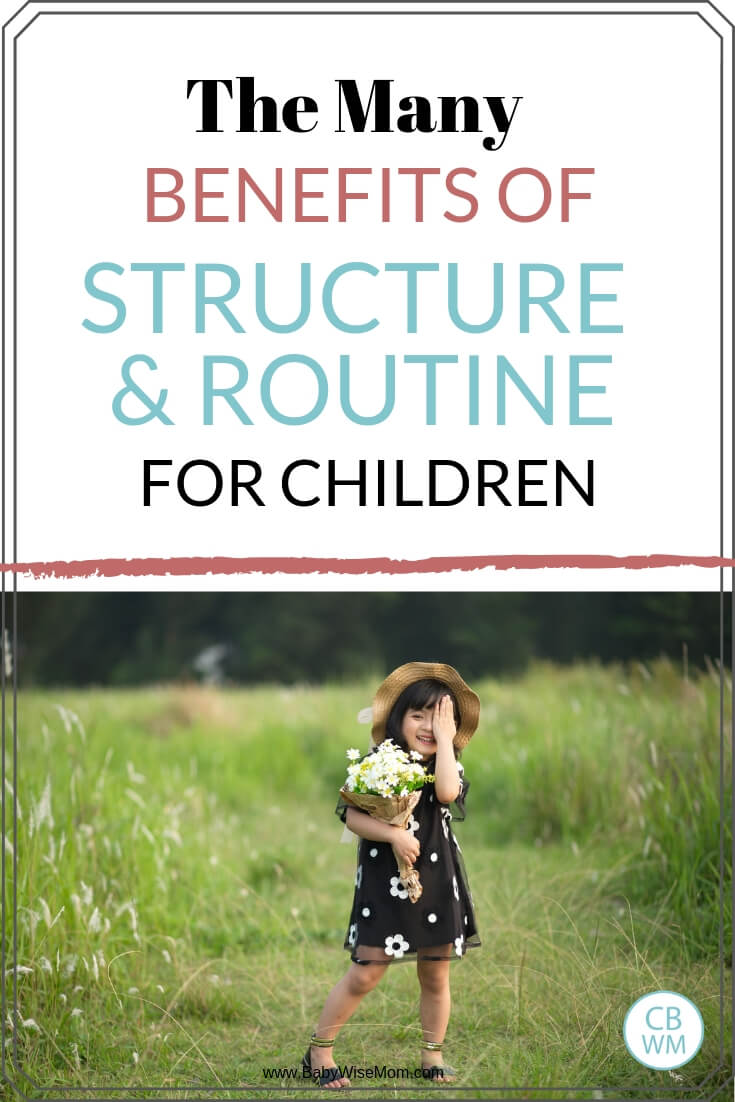The many benefits of having structure and routine in your days with your children. Read all about the benefits and get tips on structuring your day.
Children really thrive on structure and routine. So many of the difficulties that can arise during toddler years can be diminished if not eliminated all together with structure and routine.
Post Contents
Benefits of Structure in a Child’s Day
In On Becoming Toddlerwise, there is a quote from the book Simplify Your Life With Kids: “Kids who live without structure can develop behavior problems. Frequent tantrums, whining, a disregard for rules, inappropriate or aggressive behavior, constant demands, and an inability to share are some of the signs that your child needs more structure” (page 43).
You can then correctly assume that a child with the appropriate freedoms will have fewer tantrums, whine less, obey rules, share (or at least be better about sharing), etc. Those are some excellent motivating factors for having structure in your child’s life.
When you have a routine, you can be more organized and use your time wisely. You can accomplish personal goals. People often ask how I get so much done. A lot of it has to do with the structure I have in each day. I have time to work on projects. I can clean, read, work on hobbies, and more. You can also accomplish goals for your child. Perhaps you want to spend some time teaching your child various skills each day. With routine, you can do that.
Your child will find comfort in the predictable routine. I can’t tell you how often Brayden lists all the things that will happen in his day. If he is looking forward to an evening with grandparents, he will list off all the things that will happen between breakfast and the time he will visit his grandparents. It helps him get the concept of time and helps him to have patience for exciting times.
It also helps with things Brayden doesn’t look forward to. Brayden never has and never will enjoy sleeping. But naptime happens every day. He knows when it will happen; it comes as no surprise. He also knows when it will end.
You will find less need to correct your child with structure and routine. When children are left with too much time on their hands, they find mischief. When you have a routine, you have goals for each activity. Also, you move along at a predictable pace and the child just doesn’t have time to look for trouble.
Structure and Age Appropriate Freedoms
As you think through and add structure, be sure to keep in mind freedoms. Too many freedoms will lead to naughtiness. You can structure your day so that you eat, play, and sleep in structure, but still allow too many freedoms, which will cause behavior problems with your child. For more thoughts on this, see:
- How To Give Your Toddler Boundaries
- How To Teach a Child How To Make Decisions
- How To Know What Freedoms to Give Baby
- How To Stop a Tantrum by Addressing the Choice Addiction
Structure Your Day
In order to have structure and routine, you need to have a plan. Start here for tips on More Than Making It Through the Day as a Mom.
As you decide how to structure your day, keep this advice from Toddlerwise in mind, “Make sure your daily plan fits you, not someone else’s ideal” (page 46).
There is no one right schedule out there for all people on earth. Look at the options and figure out what works best for your family based on your unique situations in life. Remember Let Your Schedule Serve You: You Don’t Serve Your Schedule (Don’t Stress).
The list of benefits for a routine are for you and your family, not for anyone else, so be sure your schedule is suited for you, not anyone else.
You can certainly get ideas from other people, but you will need to adapt them to your own family.




